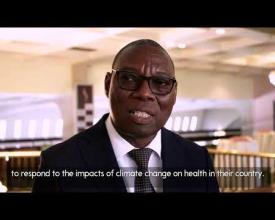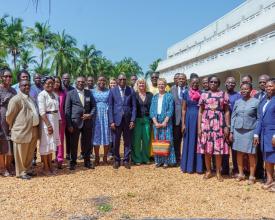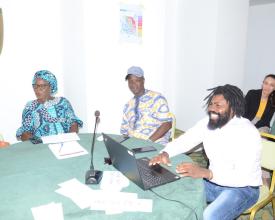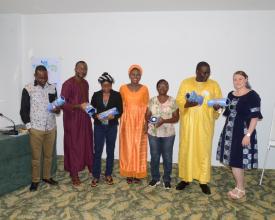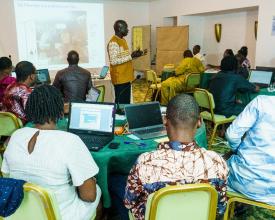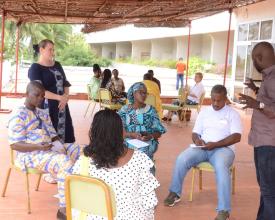
Regional Training on Climate Change and Health
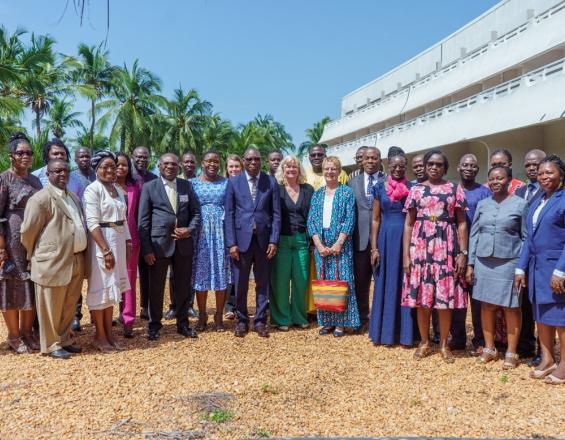
The countries of sub-Saharan Africa are already being severely impacted by the adverse impacts of climate change. Climate extremes are occurring with more intensity and more frequency. Not only do they pose a direct threat to human health and well-being (e.g. through injuries or destruction of health infrastructure), they also alter disease patterns. Most countries have not yet integrated this new reality into their programmatic health planning and budgeting. A major obstacle is still the lack of awareness and understanding that climate change impacts human health.
To address the knowledge gap, a 5-day regional training on the nexus between climate change and health was held in Togo in October 2022. This training was based on training modules produced by GIZ and WHO. Representatives of different partner countries Togo, Cameroon and Benin were invited. The training was co-organized by 5 GIZ projects and co-financed by the GIZ Sector Network Health and Social Protection (SN HeSP) through its Innovation Fund.
Context
Challenges addressed
The health impacts of climate change remain a neglected topic in the global discourse on climate change, as well as in the international health community. The reasons are manifold but can be circumscribed by the high complexity of the topic. To date, there is a lack of research, reference documents (especially in languages other than English), and experts in the field. Moreover, there is a lack in intersectoral collaboration and cooperation between the health and climate change sectors. The resulting hurdles for local policymakers to address the issue are extremely high. Especially regarding climate finance, the health sector is left out. Health ministries [MNG1] need to be strengthened in their capacity to recognize, explain, and address the impact of climate change on their development goals, while environmental ministries should likewise be sensitised to the climate change and health nexus.
Location
Process
Summary of the process
Trainings are conducted all the time, but only through careful selection of participants, content, and methodologies can such a training achieve long-term impact.
All building blocks are recommendations from the experience of the first regional training. The training set-up was carefully considered, and the building blocks reflect the elements that were key in making the training a successful one.
After being well received as a format during the pilot training, we recommend a focus on regionalisation for future iterations of the climate and health training. Mixing different countries helps break down barriers to working on a complex issue, as countries can benefit from each other's experiences.
However, it is clear that training formats cannot follow a one-size-fits-all format. The climate change-health nexus is complex at its core. It requires different sectors to come together and exchange (new) information. The choice of trainer and methods can have a big impact on how accessible the content becomes for participants. Therefore, building blocks 2-4 highlight different variables to adapt the training to different contexts and goals and outlining follow-up activities that can be used to ensure impact and effectiveness of the training.
Building Blocks
Focus on regionalisation
Bringing together different stakeholders not only from different sectors (health, environment, hydrometeorology, university, etc.), but importantly also from different countries in the same region, allows participants to network, share their experiences, and find contextually appropriate, concrete and immediately applicable solutions. The use of a regional trainer helps to address sensitive issues related to governance and finance, and to relate theory to practical examples from the regional context.
Enabling factors
The selection of appropriate participants depends on prior knowledge of the stakeholder landscapes of the participating countries. It is essential to be able to identify decision makers in the respective ministries who can place the topic in the policy dialogue.
Regarding the trainer, it is important to find a person with appropriate experience on the link between climate change and health, as well as expertise in andragogy.
Lesson learned
- The number of participating counties should be limited to three to keep the total size of the group below 30 while still including diverse stakeholders.
- One starting point in identifying participating countries is the mix of topics according to their implementation status (developed documents and studies, pledges, etc).
- There are very few suitable trainers, especially for francophone countries: a database should be developed and shared among partners. This would also enable continuity of the training and familiarity with the format and content.
Design tailored trainings to a specific purpose
The relationship between climate change and health is very complex, as many different fields come together at this intersection. The training experience showed that there is a need to tailor the training to the participants. This should be based on the previous knowledge of the participants, their professional position and the general level of implementation of climate and health activities in their respective countries.
Based on the experience utilizing the training manual in practice, several customized formats are conceivable:
- Beginner and advanced level training formats;
- Thematic training: introduction to the scientific link between health and climate change;
- Policy training: in-depth exercises to develop core policy documents such as a climate risk and vulnerability assessment and a national public health adaptation plan;
- Climate governance training: analysis of the Ministry of Health's respective positions on climate – identifying how to integrate climate issues into health policy, how to develop climate policy documents, learning about possible coordination mechanisms, highlighting the international mechanisms on climate change, how to mainstream climate issues in the Ministry of Health
Enabling factors
The success of tailoring the training depends on the information available at the preparation level and the skills and flexibility of the trainer. Prior questionnaires for participants can help determine their interest and prior experience. The trainer should have knowledge of climate change, health, hydrometeorology, and the environment, as well as being proficient in the core documents of the fields. Since this is a rare profile, determining the goal of the training early on also makes it easier to find a suitable trainer.
Lesson learned
- Potential instructors must be very experienced as the manual covers several different topics;
- Using the 16 modules of this training in 5 days is too much content and leaves little time to apply more diverse training methods;
- Objectives should be clearly stated from the very beginning of the process;
- The preparation, coordination and implementation of the training requires a dedicated support team in the hosting country with enough time, personnel and budget resources.
Resources
Be creative with the methodology
Training on an intersectoral topic such as climate change and health is more challenging for participants because their academic and practical background knowledge might not cover both topics. The training will likely cover a lot of new information for each participant. Given the complexity of the topic, it is even more important to develop and utilise a wide range of methodological approaches to maintain energy levels and focus during the training.
Enabling factors
Interactive and innovative methods require good preparation from the presenters. It is often necessary to prepare aids or specific content. Using some methods can be challenging for participants who have never encountered them before and may take more time than originally anticipated.
Lesson learned
- Add several animated or guided group work sessions
- For example: divide participants into different subgroups (i.e. by disease type: vector-borne, water and foodborne, airborne, zoonotic, direct impact) and have them work out which diseases to choose, how to investigate the link (vulnerability assessment), and how to adapt to climate impacts (national public health adaptation planning)
- Refrain from lengthy reports that repeat the previous day's content; instead, ask questions in the form of a group game (quiz);
- Share slides and summaries so participants can interact more freely and don't feel the urge to note everything down;
- Use a different icebreaker each day so the group gets to know each other better;
- Schedule site visits, guest lectures, and organise poster presentations to be held by participants.
Resources
Elaborate follow-up activities early in the process
The effectiveness of training is increased if follow-up with participants is ensured. This allows the organisers to check on the feasibility of follow-on activities discussed during the training and can account for the follow-up needs[NM1] of the participants. Follow-up activities can range from webinars to on-site activities in the respective countries
[NM1]Needs: unclear. = if something has not been understood or if there are follow up questions, or resources needed or something of the sort?
If so: see suggestion for possible re-formulation.
Enabling factors
To design appropriate follow-up activities, the content of the training needs to be defined (see Building Block 2). The diversity of activities also depends on the support structure in the countries. If partner (health or climate) projects are in place in the respective participating countries, this allows for greater diversity in follow-up activities that can be conducted.
Lesson learned
- Consideration to possible follow-up activities should be given already during the planning process;
- It is advisable to launch a survey to ask for participants interest and preference;
- The creation of a What’s App Group is a quick, easy and cost-effective way to stay in touch with participants and continuously share relevant documents and news with them.
Impacts
- 25 participants received a 5-day training on the linkage of climate hazards and health outcomes, got acquainted with the key literature on the topic and learnt about the governance and financing aspects of the field.
- The training provided a starting point for actors to develop key documents which form the strategy on how to address climate change impacts on health for their countries.
- Participants were sensitized to the importance and the challenges of multisectoral collaboration.
- Participants received relevant documents, improving access to information.
- Participants are supported with the next steps through 3 follow-up webinars.
Beneficiaries
Target group: decision-makers from the Ministry of Health, Ministry of Environment, other relevant ministries, and universities from three Francophone countries. The training did not include the peripheral levels of the ministries, or civil society.
Sustainable Development Goals
Story
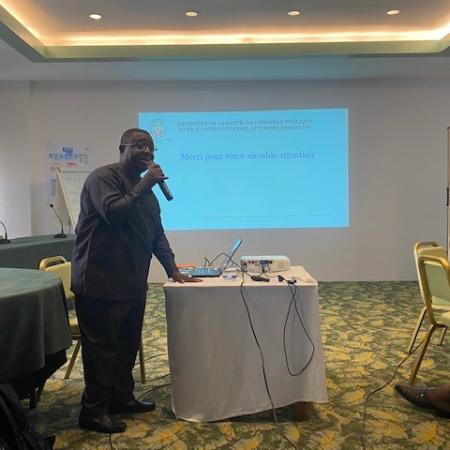
Although he has been a health professional within and outside the Togolese Ministry of Health for many years, Medanou Gbobada had no prior knowledge of the impacts that climate change can have on health. When he was selected as the focal point on the topic, he felt overwhelmed at first, as he did not know what was expected of him.
As a participant in the first regional training on climate change and health, he began to understand how the two topics are interconnected. The training allowed him to become familiarized with the principles of climate change, as well as the technical terminology, international governance structures, and information on scientific evidence. Medanou also began to understand the mechanisms of how climate risks impact health outcomes. He discovered the tools, networks, and financial opportunities available to increase the health sector's resilience to the effects of climate change.
Today, he feels more confident and excited about taking on his role as focal point. The training allowed him to set priorities and become more integrated into the climate community by attending COP27 shortly thereafter, where he began to expand his network among health and climate professionals.
As a focal point, he is in the process of integrating climate aspects into the national health development plan and national health policy, establishing a Task Force within the ministry, and taking the lead in developing a project for the Green Climate Fund.
